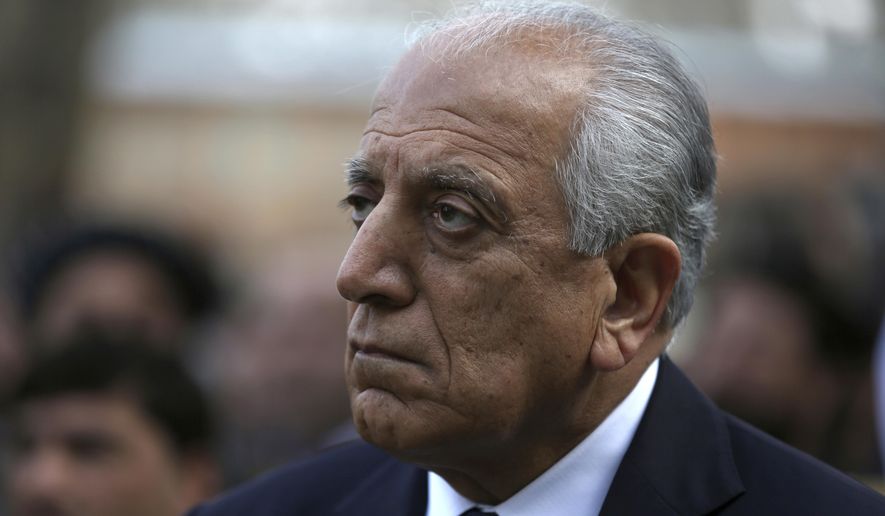The top U.S. negotiator for Afghanistan expressed optimism Monday that peace may finally be taking hold, after waves of attacks had imperilled the historic “reduction in violence” pact the Trump administration reached with the Taliban in February.
Despite a new United Nations report claiming the Taliban remains close with al Qaeda — a link the militants vowed to sever in their deal with Washington — U.S. Special Representative for Afghanistan Reconstruction Zalmay Khalilzad insisted there “has been a lot of progress” toward peace in recent weeks.
The Afghan-born Mr. Khalilzad is the point man for President Trump’s push to end the nearly 20-year U.S. combat deployment in Afghanistan and withdraw nearly 13,000 American troops.
“We are in a good place,” Mr. Khalilzad told reporters on a conference call, despite “challenges and difficulties. … We’re optimistic that finally we’re moving forward to the start of the intra-Afghan negotiations.”
Mr. Trump has complained repeatedly in recent days that U.S. forces in Afghanistan are essentially acting as an Afghan police force, and that it’s time to get out.
“Bring our soldiers back home but closely watch what is going on and strike with a thunder like never before, if necessary!” Mr. Trump tweeted last week.
The fate of talks between the U.S.-backed Afghan government in Kabul and Taliban militants is likely to determine how quickly the Trump administration can get American troops out.
The delicate negotiations stalled for much of March, April and May amid continued Taliban and terrorist violence, infighting among Afghan government officials, and a failure by both Kabul and the Taliban to follow through on a major prisoner swap.
However, a temporary cease-fire reached around the Muslim holiday of Eid al-Fitr last week set the stage for a potential breakthrough, according to Mr. Khalilzad, who said “violence was down dramatically during Eid” and has since remained “relatively low.”
As a result, he said, prisoner swaps are now taking place, with the U.S.-backed government of Afghan President Ashraf Ghani having released some 2,500 Taliban detainees, while the Taliban has released at least 400.
But uncertainty continues to swirl hopes of a final deal, with the fate of the talks uncertain and terror groups such as al Qaeda and Islamic State still operating in parts of Afghanistan.
Under the Feb. 29 agreement Mr. Khalilzad brokered with the Taliban, the militants vowed to no longer provide a safe haven for al Qaeda and to battle Islamic State factions, in exchange for a phased U.S. peace withdrawal, which is already bringing down the size of the American force to about 8,000.
Private analysts have expressed concern that the Taliban, which currently control vast territory around the Afghan countryside, are simply waiting out the Trump administration and will seek to return to power in Kabul once U.S. forces depart.
The new U.N. report contended that “senior leadership of al Qaeda remains present in Afghanistan,” and that Taliban-al Qaeda ties “remain close, based on friendship, a history of shared struggle, ideological sympathy and intermarriage.”
The internal report, submitted to the U.N. Security Council last month, claimed the “Taliban regularly consulted with al Qaeda” during negotiations leading up to the February agreement with U.S. officials — negotiations that did not include the Ghani government in Kabul.
The Taliban even “offered guarantees” to al Qaeda that the historical ties between the two groups would be honored no matter what, the report said, claiming that Al Qaeda has since “reacted positively” to the U.S.-Taliban agreement “with statements from its acolytes celebrating it as a victory for the Taliban’s cause and thus for global militancy.”
“The challenge will be to secure the counterterrorism gains to which the Taliban have committed, which will require them to suppress any international threat emanating from al Qaeda in Afghanistan,” the report’s summary warned.
Mr. Khalilzad said he had not yet read the report. But he also stressed U.S. officials “are monitoring Taliban compliance” to the deal, including the ban on a safe haven for the terror group that planned the 9/11 attacks from Afghan soil.
“We’ve had good discussions with [the Taliban],” Mr. Khalilzad said. “We believe that there is progress, but we will continue to monitor … very closely.”
Mr. Khalilzad said that the Pentagon is “proceeding with the drawdown” of American forces from Afghanistan, but he stressed that the U.S. troop withdrawal remains “conditioned on what the other side’s commitments are and their delivery on those commitments.”
• Guy Taylor can be reached at gtaylor@washingtontimes.com.




Please read our comment policy before commenting.